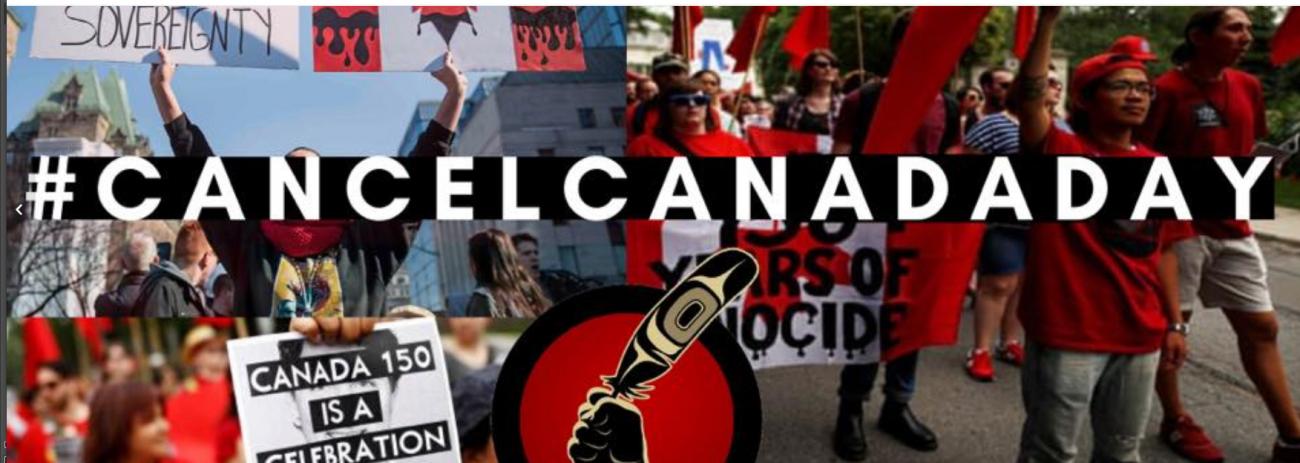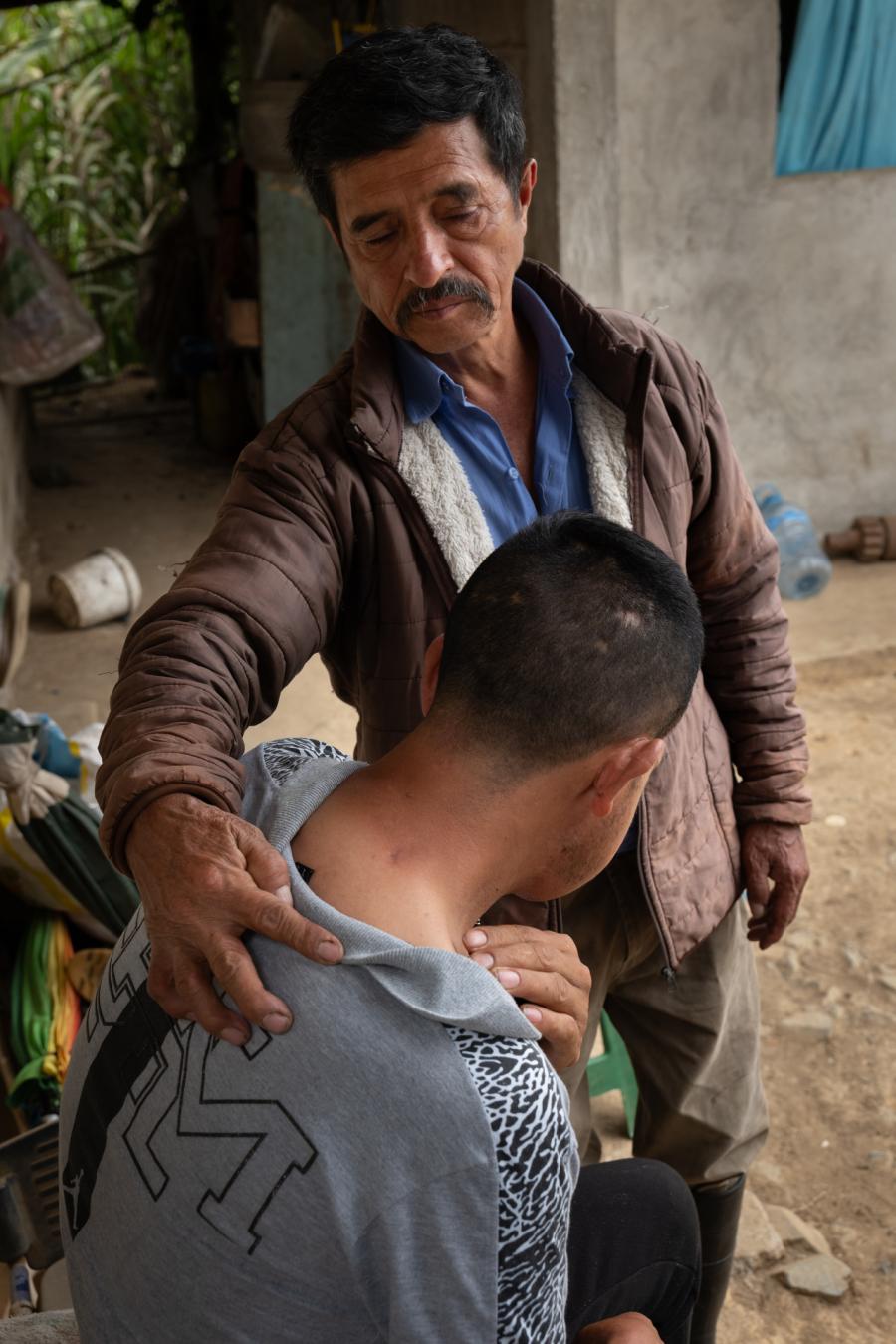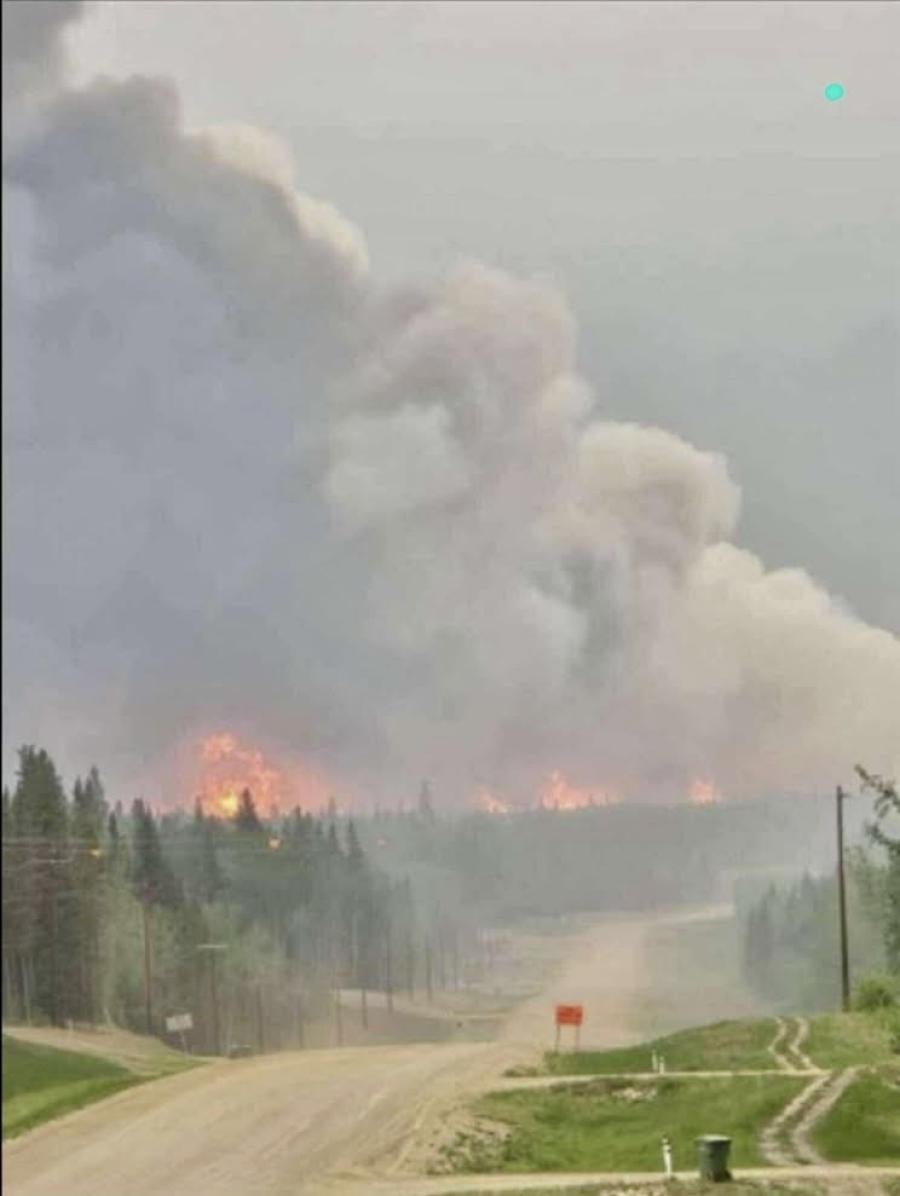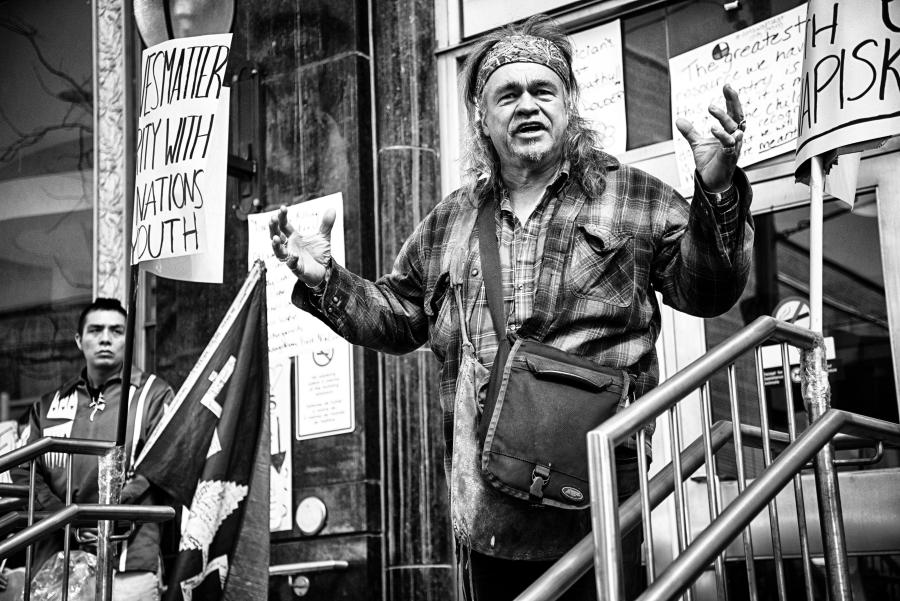
By Phillippa Pitts
Organized by Idle No More, an Indigenous rights advocacy group, Cancel Canada Day brought together scholars, poets, parents, musicians, filmmakers, and activists for a three-hour digital convening on July 1, 2020. The event, streamed on Facebook live, accompanied the in-person protests and direct actions happening simultaneously across the nation.
“It’s not that we are fighting against Canada,” clarified speaker Sleydo’ (Molly Wickham), an activist whose home at the Gidimt’en check-point in Wet’suwet’en territory has been raided twice by armed mounted police. “We are fighting for ourselves. For our sovereignty, for our ability to be free Indigenous people, to live and not be killed in the streets, or killed in our territories, incriminated, removed from our territories like so many generations of our children have been. It comes from this place of love and rage and all of these teachings we have as Indigenous People and centuries of knowing that we have to survive.”
Erica Violet Lee, of Idle No More, hosted the Facebook Live event.
Sleydo’s words echoed those of opening speaker Ellen Gabriel, an internationally lauded Indigenous rights activist and artist. “It is not because we hate Canada or hate Canadian citizens, it is because we love peace that we are trying to gain some kind of foothold. A right to self determination that does not come from colonizers.” Gabriel slowed to emphasize: “We do not need Canada to tell us we are self determining. We already know that.”
Coming together from a range of backgrounds and expertise, the event’s speakers interrupted popular myths of Canada as a safe, pleasant space. They shared their stories of discrimination in the classroom, on the street, in doctor’s offices, and in political spaces. As Gabriel said, “Reconciliation is not dead, it has never happened.”
Speaking from her home on unceded land, Sleydo drew a direct line between past and present violence, saying, “Canada looks like militarized RCMP [Royal Cavalry Mounted Police] invading our territories--walking around with automatic weapons where we smoke our fish, have our ceremonies, where our elders go to pick medicine. These are things that have been happening to us in the last two weeks. These are things that we experience on a day to day basis... it looks slightly different from smallpox, from slaughtering our people and taking our children away to residential schools, but it’s just a different face.”
Film stills from Smudge Don’t Judge aired during Idle No More’s Cancel Canada program.
Later in the program, filmmakers Audrey Huntley, Monica Forrester, and Dr. Alex Wilson added examples from their own experience working with trans and Two Spirit people. Screening trailers from their films, Smudge Don’t Judge and Not Just Another Case, they spoke the names and shared the faces of missing and murdered Indigenous women and condemned the ongoing failure of the Canadian police to protect and serve. Forrester—a Two Spirit woman of color who has been an advocate for trans health, inclusion, and well-being for over 25 years—did not mince words about the danger her communities face. “I always thought: am I going to live past 30? Because all of my peers were dying so young,” she recalled while describing the lethal discrimination Indigenous LGBTQ2IA people face even in spaces “designed” to serve them.
“When does it stop?” asked Gabriel, “Do you physically have to see with your own eyes people dying before you understand what we have been trying to tell you: that we are human beings too. That we have the right to survive, to thrive, to our languages, to nurture our future generations… Assimilation continues and so does our fight.”
Despite these painful truths, the tone of Cancel Canada Day was solution-oriented and future focused. On a live feed of a rally in Vancouver, virtual attendees heard Audrey Siegel give a powerful address. She called out to a carefully-distanced crowd of rain-soaked Indigenous and non-Indigenous attendees: “Any benefits that you have that come at my expense, I need you to give them up and I need you to do it now… We want to rise with you, we want to heal with you, we want to do it in a way that Canada cannot do.” Naming human rights violations from police brutality, addiction stigma, epidemics, and the reservation school system, Siegel continued, “We know what it’s like to be pushed aside and forgotten and we will not let that happen to anyone.”
Her message echoed across the event. Following Siegel’s speech, musician Dakota Bear called for a movement composed of “all colors of the medicine wheel: Black, white, red, Free Palestine, Free Hong Kong, Black Lives Matter!” From digital host Erica Violet Lee’s opening remarks, claiming the day “in honor of all lives lost to the Canadian state: Black, brown, Two-Spirit…,” speakers and attendees alike continuously exchanged messages of support and solidarity through the duration of the program.
Livestreaming a Cancel Canada rally in Vancouver.
Khodi Dill, a biracial and Métis writer, educator, and spoken word artist, challenged the depth of these promises in his commanding virtual performance. He asked, “Is it easier for those here in Canada to see injustice south of the border than to take a stand for those fighting for injustice right around them?” He then pushed further, “Is it easier to look at the United States than it is to look in the mirror? The oppression of Blacks and the oppression of Indigenous people--and all oppressed people--are inextricably linked. We remain stolen people on stolen land. Canada, don’t stand up for me if you won’t stand up for Indigenous people.”
As a whole, the event highlighted the resiliency of Indigenous and First Nations Peoples in Canada, even after centuries of colonization and forced assimilation, even in the midst of ongoing violence and environmental degradation, while Indigenous women and children go missing and 4,000 children still lie in unmarked graves outside of residential schools. Even during a pandemic, the event’s message was one of hope and power. Indigenous people are making drums, making songs, making medicine, making communities. They are stepping in where the state does not. The revolution they describe is carried out on reserves and in university classrooms, at the United Nations and at the local pharmacy, in city streets and in peoples’ home. This last form was beautifully described by poet Tasha Spillett-Sumner, who spoke from her own sofa, holding her own infant child.
The Revolution wants kisses for where it hurts and extra cuddles at bedtime.
You breastfeed the Revolution and tell it stories.
The Revolution is wherever we are and some of our bodies are at home,
Raising the Revolution.



